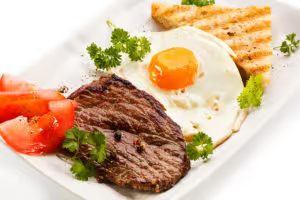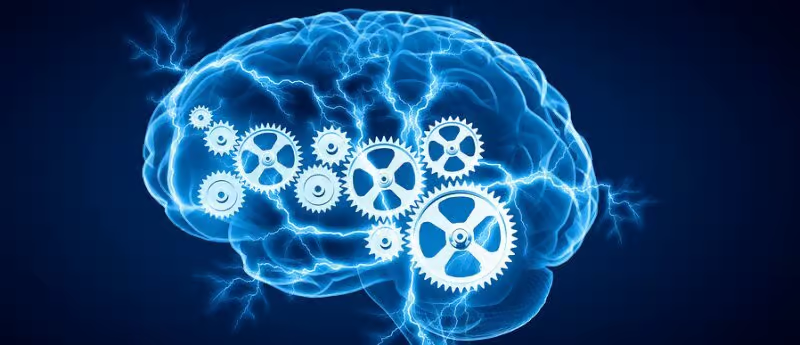Table of Contents
Phosphatidylcholine (PC, or Ptd-Cho) is one of two fatty acids that make up the outer layer of the membrane covering each of the 70 trillion cells in your body.
Phosphatidylcholine is also converted in your body through a process called hydrolysis to make up the fatty acids AA, oleic, linoleic, linolenic, and DHA. These fatty acids contribute to the signaling within and between brain cells for long-term potentiation (LTP). LTP is behind the formation of long-term memories.
The synthesis of the neurotransmitter acetylcholine (ACh) is largely dependent on the choline provided by Phosphatidylcholine. ACh is critical for cognition, learning and memory.
When you don’t have enough Phosphatidylcholine, brain cell membranes lose integrity and eventually die.
Some Phosphatidylcholine (PC) is naturally synthesized in your body. We also get PC from some of our food including beef, oysters, eggs and some vegetables. As a nootropic supplement, Phosphatidylcholine is derived from lecithin found in soybeans and sunflower seeds.
Note that lecithin and Phosphatidylcholine are NOT the same thing. Plain lecithin is not an efficient source of Phosphatidylcholine or choline. As a nootropic, look for as pure of a source of Phosphatidylcholine (PC) as you can afford.
Phosphatidylcholine helps:
- Neuroprotection: Phosphatidylcholine (PC) is a major component of brain cell membranes. And neurons use some of this choline to synthesize acetylcholine (ACh). Supplementing with PC restores the PC that is needed for brain cell membrane integrity. While providing neurons with the ACh needed for memory and learning.
- Neurotransmitters: Phosphatidylcholine increases concentrations of choline and acetylcholine in the brain. Improving memory and cognition.
- Neurogenesis: Phosphatidylcholine helps restore damaged brain cells. Making them more fluid and permeable allows the proper flow of chemical messengers and nutrients into and out of the cell. And improving overall cell function and efficiency. Resulting in better cognition, learning, memory, and mood.
Overview
Phosphatidylcholine (PC, or Ptd-Cho) is a phospholipid that plays a critical role in every cell in your body. Including your brain.

Your brain cells are each encased in a membrane. This bi-lipid layer of two fatty acid tails face each other. The outer layer of each cell contains mostly the phospholipids phosphatidylcholine (PC) and sphingomyelin, while the inner layer contains predominantly phosphatidylserine (PS), phosphatidylinositol, and phosphatidylethanolamine.
The outer layer of each cell membrane is highly permeable. But the inner layer is much less permeable. These two fatty acid tails are in a constant state of movement, vibrating at millions of times a second. This continual vibration could be considered the ‘backbone of life’. And is the basis of everything that happens in your brain.
The amount and type of long-chain fatty acids in your diet affects the composition of these cell membranes. The structure and function of your cells depend on the ideal balance of fats including cholesterol, oleic, palmitic and stearic fatty acids. And essential fatty acids like Omega 3. Without this proper balance, cell membrane function is compromised.
And you can be sure that our modern diet does not provide the ideal balance of fatty acids (phospholipids) to maintain brain cell integrity. It’s why you experience brain fog, memory loss, slow thinking and poor decision making.
Some progressive health care researchers and practitioners have found that supplementing with phosphatidylcholine (PC) can lessen the symptoms of diseases like MS, diabetes, immune system problems, asthma, and neurodegenerative diseases like Alzheimer’s.
You naturally get phosphatidylcholine (PC) from foods such as beef, eggs, oysters, broccoli and brussel sprouts. Supplemental phosphatidylcholine (PC) is made from lecithin found in soybeans and sunflower seeds.
Phosphatidylcholine (PC) maintains the integrity of brain cell membranes. And is directly involved in acetylcholine (ACh) synthesis. ACh is needed for cognition, learning and memory formation.
How does Phosphatidylcholine work in the Brain?
Phosphatidylcholine boosts brain health and function in several ways. But two in particular stand out.
- Phosphatidylcholine is needed for long-term memory. The hydrolysis of Phosphatidylcholine (by a process called phospholipase A2-catalyzed hydrolysis) is used to make the free fatty acids AA, oleic, linoleic, linolenic and DHA.
These free fatty acids facilitate synaptic transmission by targeting nicotinic ACh receptors using protein kinase C (PKC). This messenger system is needed for long-term potentiation (LTP). Researchers have determined that these fatty acids are critical for learning and memory.[i]
- Phosphatidylcholine helps repair neurons. Cholinergic neurons are unique among cells because they serve two functions. PC is a major component of brain cell membranes. And serves as a storage pool for the choline needed as a precursor for acetylcholine (ACh) synthesis.
Researchers demonstrated how this works. They incubated human cholinergic cells in the lab. And followed the metabolic link between membrane composition and turnover, and ACh synthesis. And proved that ACh is synthesized from choline derived from the degradation of Phosphatidylcholine.
If there is not enough choline available to maintain brain cell membrane integrity, and to synthesize the neurotransmitter acetylcholine, brain cell function breaks down. You experience brain fog, poor memory and decision making. And ultimately leading to neurodegenerative diseases like Alzheimer’s, and other motor neuron disorders.[ii]
How things go bad
As you get older, your brain chemistry and energy metabolism changes. This can happen at any age once you enter your adult years. Low Phosphatidylcholine levels have even been found in newborn babies.
↓ Brain cell membranes degenerate
↓ Recall, reaction time and mood diminish
↓ Acetylcholine levels decline
All of these changes can happen at any age. Your body is influenced by the food you eat, what you drink, lifestyle habits, the air you breathe and more.
So Phosphatidylcholine can help for age-related cognitive decline, as well as a student looking to do better in school.
Phosphatidylcholine benefits
Phosphatidylcholine (PC) has been around as long as humans have walked this planet. PC is a critical component of the top layer of the membrane surrounding each one of the cells in your body.
And yet some are talking about Phosphatidylcholine as the “New Wonder Drug”. How could this be? Turns out that PC is a fatty acid. As are many of the fats you consume in your modern diet.
Long-chain fatty acids affect the composition of your cell membranes. When you eat bad fats your cell membrane fluidity is affected, ion channels disrupted, hormones, regulation of neuroreceptors, signaling and other signaling chemicals are affected.
Incorrect amounts or types of long chain fatty acids can lead to a cascade of serious health and cognition problems.
The easiest and simplest way to correct many of these cognition problems is to supplement with Phosphatidylcholine as a nootropic. You’ll feel better as cells are repaired. Digestion issues could be eliminated or minimized. And brain fog, cognition and memory problems could become a non-issue.
How does Phosphatidylcholine feel?
If you eat a perfectly healthy diet and are in optimal physical and mental health, using Phosphatidylcholine may not do anything for you.
But if you’re like most in the Western world relying on fast food, processed food and other unhealthy lifestyle habits, then PC may help.
Neurohackers report that supplementing with Phosphatidylcholine lifts brain fog, improves working memory and boosts alertness.
Others say it helps them prevent anxiety and panic attacks. Mental clarity is improved, and energy levels rise.
Ray Kurzweil, the famous inventor and futurist, gets phosphatidylcholine intravenously once a week at his health clinic. His theory is that this will rejuvenate all his body’s tissues.[iii]
Phosphatidylcholine Clinical Research
A double-blind study in California with 80 college students investigated the effect of Phosphatidylcholine on memory. The students received a placebo or either 10 or 25 grams of Phosphatidylcholine (PC). 25 grams of PC was estimated to supply about 3.75 grams of choline.
Memory was tested at 60 and 90 minutes after taking PC. The researchers recorded a significant improvement in memory after 90 minutes, and only a slight improvement after 60 minutes.
This 1993 study was the first to test the relationship between a single dose of Phosphatidylcholine on memory in healthy human subjects.[iv]
Phosphatidylcholine Prevents Brain Cell Death
Streptococcus pneumonia is the most common cause of bacterial meningitis. And is the most common cause of death from pneumonia. If it doesn’t kill you, it can cause paralysis, mental retardation and learning disorders.
In humans, it’s your hippocampus neurons that are the first to die as a result of meningitis. Cell death is officially called “apoptosis”. But I’m using cell death to drive a point home.
Phosphatidylcholine (PC) is an essential component of your cell membranes. And a deficiency of PC, either from chemicals, disease, or bad nutrition leads to cell death. And the first to go are your hippocampal neurons. The same neurons used for learning and memory.
Researchers in Tennessee found that a variety of brain cells die after you get pneumonia. Because it interferes with Phosphatidylcholine synthesis. And apoptosis inhibitors can’t even stop this cell death from happening.
The research team determined that the only way to prevent cell death from pneumonia infection was supplementing with Phosphatidylcholine. Even after the infection set in.
The researchers concluded that supplementing with Phosphatidylcholine was the best way to prevent what they called an “apoptotic cascade”. And the best therapeutic intervention.[v]
Phosphatidylcholine Improves Memory
Studies on the effect of Phosphatidylcholine on memory are limited. So researchers in Japan decided to remedy this lack of data by testing PC in mice with dementia.
They administered PC to mice with dementia and to normal mice. And compared differences in memory, choline and acetylcholine concentration, and choline acetyltransferase (ChAT) activity. ChAT is the enzyme responsible for the synthesis of acetylcholine in the brain.
The researchers found that giving phosphatidylcholine for 45 days to mice with dementia improved memory. And generally increased brain choline and acetylcholine concentrations to or above the levels of the normal control mice.
The research team concluded that phosphatidylcholine increases brain acetylcholine concentration and improves memory.[vi]
Phosphatidylcholine recommended dosage
Recommended Phosphatidylcholine dosage is 1,200 mg to 5 grams per day. And divide your total daily dose into 2 or 3 equal doses and dosed throughout the day.
To enhance bioavailability and boost absorption, take PC 30 with a meal or tablespoon of unrefined coconut oil or extra virgin olive oil.
Do not take Phosphatidylcholine with acetylcholinesterase (AChE) inhibitors since this combination may excessively increase acetylcholine (ACh) levels and potentially cause cholinergic side effects. AChE inhibitors include donepezil (Aricept), Tacrine (Cognex), rivastigmine (Exelon) and Huperzine-A.
Phosphatidylcholine Side Effects
Phosphatidylcholine is naturally produced in your body and is considered well tolerated and safe. PC is not toxic.
Some may experience sweating, stomach upset and diarrhea. Particularly if you’re already high in choline.
Type of Phosphatidylcholine to buy
Phosphatidylcholine is sold in tablet, capsule, liquid and powder form. Capsules can run from 420 – 1,300 mg each. 500 mg of Phosphatidylcholine in powder form is equivalent to 2-level 1/8 tsp scoops.
Phosphatidylcholine is sometimes used interchangeably with “lecithin” which is misleading and simply not accurate. Choline is a component of phosphatidylcholine, and is also found in very small amounts in plain lecithin. Although closely related, these terms are not the same.
You will experience the nootropic benefits by supplementing with Phosphatidylcholine but not with lecithin.
Nootropics Expert Recommendation
Phosphatidylcholine 1,200 mg to 5 grams per day
 I recommend using Phosphatidylcholine (PC) as a nootropic supplement.
I recommend using Phosphatidylcholine (PC) as a nootropic supplement.
Phosphatidylcholine helps build and repair cell membranes. And is found in every one of the 70 trillion cells in your body.
You can get Phosphatidylcholine from some of the food you eat. But Phosphatidylcholine is only found in foods like beef, eggs, oysters and some vegetables. PC levels decline as you age and you are unlikely to get nearly enough through diet. So to get its benefits you must take it as a nootropic supplement.
Phosphatidylcholine is vital to maintaining optimal brain health. And has been shown to increase cognitive energy, boost brain function, enhance communication between neurons, and protect neural membranes from free radical damage.
I suggest starting with a dose of at least 1,200 mg daily. Phosphatidylcholine is a great compliment to a stack including any nootropic from the racetam-family. Anything that causes an increase in uptake of acetylcholine in your brain.
You need to provide your brain with the choline it is demanding. Or it starts cannibalizing your own brain cells to make more acetylcholine. Signs that you’re lacking adequate choline or acetylcholine are headaches.
Use Phosphatidylcholine at a ratio of 1:4. For example, 250 mg of Phosphatidylcholine to 1,000 mg of Aniracetam.
If you have liver damage like cirrhosis, you may want to increase the dose up to 4.6 grams per day for liver repair.








Join The Discussion - 141 comments
Jonathan
June 30, 2020
Hi David,
I’m currently putting together a stack, and was curious re AChE inhibitors. I’ve recently been tacking 400mg – 800mg of Phosphatidyl choline each day, and 200mcg of Huperzine A every other day. I’ve just read on this page not to combine the 2, but I’m curious as to how using alpha gpc would then be any better or differ the interaction. If PC is converted into Alpha GPC as the brain needs it, can I get away without Alpha GPC if I have decent PC supplement (supposing I can carefully combine it with Hup A? It would certainly be more budget friendly…
I’m also taking 1-2 g of Ashwagandha split between the morning and afternoon, which I understand can also contribute to changes in Acetylcholine levels?
David Tomen
July 1, 2020
Jonathan, both Huperzine-A and Ashwagandha are acetylcholinesterase inhibitors which increases acetylcholine levels in your brain. It’s unlikely you’ll get any more benefit by adding Alpha GPC to the PC you are already using.
Lisa
June 26, 2020
Hello,
I can not seem to find liquid Phosphatidylcholine. I am currently taking Liquid Reduced Liposomal Glutathione 500Mg that also has 500Mg of Phosphatidylcholine from Sunflower Lecithin. I need to get a little more Phosphatidylcholine for a regular fatty Liver and Gallstones. Any advise?
Thank you
David Tomen
June 27, 2020
Lisa, if you can’t find liquid Phosphatidylcholine then use capsules. But I did find one by Body Bio that’s a liquid here: https://amzn.to/2A91xzU
Alex
June 18, 2020
I can’t find an article about ‘Choline Chloride’ on this website. Apparently it has superior level of choline (74.6%, compared to A-GPC’s 40.3%). For example, here is one product: vitacholine
(however, for some reason they put very little choline in those caps…)
Is Choline Chloride any good? Is it safe for humans?
Also, just wanted to point out an important warning regarding phosphatidylcholine and Choline bitartrate: PS can cause artery hardening and increases chances of heart attacks, and CB is known for causingg kidney stones (source: Consumer Lab)
David Tomen
June 20, 2020
Alex, if you check the manufacturer’s website you’ll soon learn that Vitacoline is one of the oldest nootropic supplements around. It’s choline bitartrate. And any experienced neurohacker will tell you that you need a couple of grams of choline bitartrate to replace something like Alpha GPC or CDP-Choline.
And I’ve yet to see clinical proof that Phosphatidylcholine can cause hardening of the arteries. I’ve got problems with Consumer Lab because they take donations from manufacturers who want to avoid negative reviews. And I have yet to see a link to clinical evidence for anything they have to say when making negative comments about specific supplements or nutrients.
Ramon
March 12, 2020
Does Phosphatidylecithin need to be cycled. I take 100 mg per day.
David Tomen
March 12, 2020
Ramon, it does not. Your body and brain require it every day.
Mike
February 29, 2020
what do we think of the other form of choline in biosil ?
David Tomen
February 29, 2020
Mike, the active ingredient in BioSil is choline-stabilized orthosilicic acid (ch-OSA). Orthosilicic acid is just a silicon atom surrounded by four hydroxide (OH) units, but it is unstable on its own. Which is where choline comes into play.
It is supposedly effective for thickening hair and nails. Clearly not a nootropic. But this is what McGill University in Montreal have to say about BioSil: https://mcgill.ca/oss/article/health-general-science/can-biosil-really-help-thicken-my-hair-and-nails
Paul Sarro
January 26, 2020
Hi David, I wanted your opinion on Sunflower lecithin, example brand being NOW. Would this be a good source of Phosphatidylserine Choline? Trying to stay soy free.
Thank you
David Tomen
January 26, 2020
Paul, good find because all other PC supplements are made using soy lecithin. NOW Foods is the first one I’ve seen that uses sunflower lecithin which of course is preferred over soy.
Josh
October 6, 2019
Hello, I recently purchased PC and PS due to your recommendations, I noticed PC tends to give me a achy head and neck area. I eat a lot of red meat and eggs so Im thinking I have enough choline? What would you say?
I stacked PC,PS,AlphaGPC,Citi choline, Lcarnatine,Huperzine A.
David Tomen
October 6, 2019
Josh, you’re likely correct because everything in this stack contributes to the synthesis of acetylcholine. What exactly are you trying to achieve?
Josh Greene
October 7, 2019
Thanks for the reply. I have ADD, and I tend to try and recall words often even though I can think clearly. I’m also starting professional education classes so I’m trying to make sure I’m clear headed, focused and short and long term memory are good!
David Tomen
October 8, 2019
Josh, I get it. The thing is much more than good acetylcholine production is necessary for memory. Please see this post: https://nootropicsexpert.com/best-nootropics-for-learning-and-memory/
Jason
February 24, 2019
I am reading that lecithin is linked to heart attacks and strokes per the latest studies. SHould be limit our intake then. Can you just take choline instead of PC will it still help adrenal fatigue? Or must it be PC from lecithin?
David Tomen
February 25, 2019
Jason, once again as supposed ‘doctor’ is equating lecithin with Phosphatidylcholine. Lecithin and Phosphatidylcholine (PC) ARE NOT the same thing. The studies in this review are for PC which is a phospholipid making up much of the outer layer of nearly every cell in your body. In manufacturing, PC is usually derived from lecithin. But is NOT lecithin.
I’ve found the best thing for me personally for adrenal fatigue are “Adrenal Caps” by Solaray: https://amzn.to/2BSeHPz
Wim
February 23, 2020
Thanks David,
I read you like 2-way dynamic communication between all.
I think I found an article about PhosphatidylCholine and Cardiovascular Risk.
https://www.nejm.org/doi/full/10.1056/nejmoa1109400
I try to stimulate my Parasympatic Nervous system to counter the out of balance sympatic nervous system with to much adrenaline affecting my hart -> AF
So AcetylCholine is the transmitter of PN. and I thought Phosphatidylcholine would be a good way to increase AC .
David & Jason, what is your take on that art. about PC?
David Tomen
February 23, 2020
Wim, a more popular method of increasing acetylcholine is with Alpha GPC or CDP-Choline. You can use PC but it’s not used as often as the other two nootropics I mentioned.